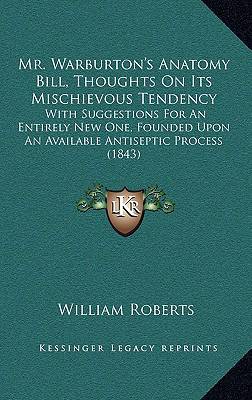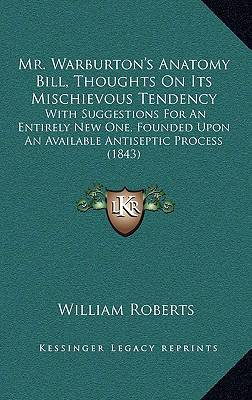
- Afhalen na 1 uur in een winkel met voorraad
- Gratis thuislevering in België vanaf € 30
- Ruim aanbod met 7 miljoen producten
- Afhalen na 1 uur in een winkel met voorraad
- Gratis thuislevering in België vanaf € 30
- Ruim aanbod met 7 miljoen producten
Zoeken
Mr. Warburton's Anatomy Bill, Thoughts On Its Mischievous Tendency
With Suggestions For An Entirely New One, Founded Upon An Available Antiseptic Process (1843)
William Roberts
Paperback | Engels
€ 29,95
+ 59 punten
Uitvoering
Omschrijving
Mr. Warburton's Anatomy Bill, Thoughts On Its Mischievous Tendency: With Suggestions For An Entirely New One, Founded Upon An Available Antiseptic Process is a book written by William Roberts in 1843. The book is a critique of the Anatomy Act of 1832, also known as Mr. Warburton's Anatomy Bill, which allowed for the legal dissection of unclaimed bodies for medical research. Roberts argues that the bill has led to the mistreatment of the poor and vulnerable, who are more likely to have their bodies taken for dissection. He suggests an alternative bill that would use antiseptic processes to preserve bodies for medical research, rather than relying on unclaimed bodies. The book provides a detailed analysis of the problems with the current bill and offers a practical solution that would benefit both the medical profession and the public. Overall, Mr. Warburton's Anatomy Bill, Thoughts On Its Mischievous Tendency: With Suggestions For An Entirely New One, Founded Upon An Available Antiseptic Process is an important historical document that sheds light on the ethical issues surrounding medical research in the 19th century.This scarce antiquarian book is a facsimile reprint of the old original and may contain some imperfections such as library marks and notations. Because we believe this work is culturally important, we have made it available as part of our commitment for protecting, preserving, and promoting the world's literature in affordable, high quality, modern editions, that are true to their original work.
Specificaties
Betrokkenen
- Auteur(s):
- Uitgeverij:
Inhoud
- Aantal bladzijden:
- 114
- Taal:
- Engels
Eigenschappen
- Productcode (EAN):
- 9781165472031
- Verschijningsdatum:
- 10/09/2010
- Uitvoering:
- Paperback
- Formaat:
- Trade paperback (VS)
- Afmetingen:
- 152 mm x 229 mm
- Gewicht:
- 163 g

Alleen bij Standaard Boekhandel
+ 59 punten op je klantenkaart van Standaard Boekhandel
Beoordelingen
We publiceren alleen reviews die voldoen aan de voorwaarden voor reviews. Bekijk onze voorwaarden voor reviews.











